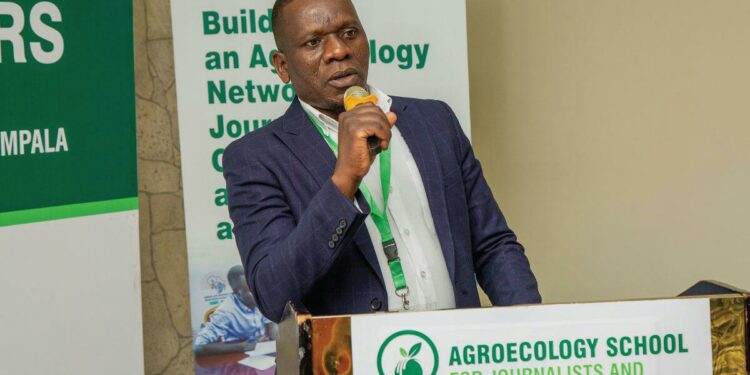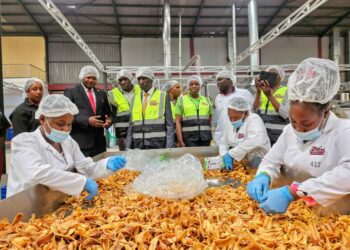Policymakers in Uganda have been fervently urged to robustly support the ingenious organic agricultural innovations masterminded by smallholder farmers, serving as a catalyst for advancing agroecology throughout the nation.
This appeal was made by Hakim Baliraine, a small holder farmer and regional chairperson on Board of Directors for Eastern and Southern Africa Small Scale Farmers Forum (ESAFF Uganda), during the Agroecology Conference at Hotel Africana, Kampala, on February 25th, 2024.
Meticulously organized by ESAFF Uganda under the theme “Agroecology Through the Lens,” the conference brought together journalists and communicators from five East African countries.
This illustrious event provided a platform for these professionals to engage, converse, comprehend each other, and share experiences, challenges, and opportunities related to reporting on Agroecology.
Being the first of its kind in both Uganda and East Africa, the conference aimed to celebrate these journalists for their understanding of Agroecology, their proficiency in reporting on it, and their ability to identify and rectify past gaps and erroneous narratives in the field.
It is noteworthy that the uptake of organic farming among smallholder farmers in Uganda has seen sluggish growth, with the value of organic exports showing a marginal increase that nearly plateaued over the last three years.
According to recent statistics from the Ministry of Agriculture, Animal Industry, and Fisheries (MAAIF), the proportion of organic agriculture, in relation to other organic exports, has experienced a tepid growth over the past four years, comprising 17% in 2017, 8% in 2018, 10% in 2019 and 23% in 2020.
In light of this context, Baliraine developed a comprehensive concept aimed at ensuring that not only the private sector takes the lead in promoting agroecology but also the government actively supports the financing of innovations by small-scale farmers engaged in organic farming practices.
“Officials from the government we wouldn’t like to see you people leaning on one side when it comes to allocation of resources to the agricultural sector. We would like to see that when a portion of funds come, let some be allocated to improve on the innovations of these small scale farmers who are undertaking innovations in Agroecological practices,” Baliraine stated.
Dr. Ivan Lukanda, a senior lecturer of Journalism and Communication at Makerere University, who was a guest speaker at the event, shared his perspective on the matter.
He urged the government not to solely focus on large-scale farmers, typically involved in industrial crop production. Instead, he emphasized the importance of providing financial support to all entities in crop production, including small entities and farmers’ associations engaged in organic farming.
“When practicing agroecology and discussing responsible governance, it is crucial that our governments not only remain responsive to large organizations but also extend their consideration to small organizations. Additionally, there should be a focus on circular economies, which involve viewing agriculture in conjunction with other aspects. The primary advocacy is for the establishment of national standards for organic produce,” said Dr. Lukanda.
During the conference, journalists had the opportunity to discuss their most significant experiences and challenges when reporting on Agroecology. Nearly every journalist present seized this opportunity to sound an alarm and strongly criticize their respective editors.
These editors were criticized for refusing to publish Agroecology stories, despite their national significance aligning with government objectives of achieving food security and addressing climate change in the country.
Dr. Lukanda advised the frustrated journalists to take into consideration that various media houses have distinct editorial policies.
Furthermore, he emphasized that if a story is not published, there is a possibility that it did not meet the editorial criteria. He also encouraged them to engage with editors, fostering openness and learning from any shortcomings that might have resulted in their agroecology stories not being published.
Sunday Bob George, the Senior Agricultural Officer for Food at MAAIF, who was a keynote speaker at the event advised journalists to steer clear of potential harm while telling impactful stories on Agroecology.
He strongly cautioned them against making comparisons between organic and conventional farming in a manner that portrays the latter negatively. This approach, he emphasized, not only ensures their safety while reporting but also increases the likelihood of getting their stories published.
“I urge all journalists and communicators to promote and speak about the beauty of Agroecology to the public in several dimensions. That is the only way people will be interested in taking up Agroecology,” he said.
As strong voices demanding governmental support for organic agricultural innovations reverberates, the call remains clear – a united front for sustainable farming practices, equitable resource allocation, and responsible storytelling to drive change in Uganda’s agricultural landscape.
Do you have a story in your community or an opinion to share with us: Email us at editorial@watchdoguganda.com












